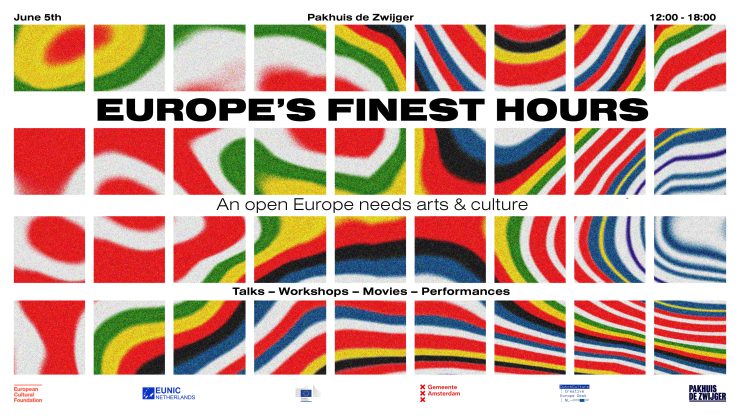Immerse yourself in the ever-changing cultural landscape of Europe in Pakhuis de Zwijger. Today, we tackle key European themes through the lens of arts and culture. Rather than political monologues or debates as a way to understand the elections the next day, we bring stories as expressed by artists, thinkers, films and performers that will illustrate, nuance and offer new perspectives to the challenges of our time. Together with a broad group of European partners we make sure you get to know people and places from various European countries. Join the conversations that resonate with you ahead of the European Elections by customizing your Finest Hours in this programme; registration to all programmes is free. . Will we meet you on the 5th of June?
Register for the programmes of your choice on the Pakhuis de Zwijger website🔗
TIMETABLE
12:00 – 12:30 | Plenary opening
During a fantastic opening filled with music and stories, we will discuss the importance of cultural exchange between the city of Amsterdam and Europe as a continent. We will discuss why it is so important to talk about culture, one day before the European elections. And how cultural exchange can be the breeding ground for conversations about important themes for the future.13:00 – 14:00 | Young & Animated (SHORTS – ENG)
Get to know the creative energies and storytelling by emerging Estonian and Lithuanian animators – what’s their take and what’s at stake for a young generation in these Eastern European nations?
13:00 – 14:00 | Young & Animated (SHORTS – ENG)
By EUNIC NL Members: Embassy of Estonia and Litouws Cultureel Centrum
Get to know the creative energies and storytelling by emerging Estonian and Lithuanian animators – what’s their take and what’s at stake for a young generation in these Eastern European nations?
13:00-14:00 | Unity in Diversity: Languages of Europe (WORKSHOP – ENG)
By EUNIC NL Members: Embassy of Austria, Instituto Cervantes Utrecht, European Commission Representation in The Hague
The one hour-long event will center upon the theme of multilingualism and its advantages. Rather than discussing the importance, utility, and official status of languages, the focus will be on exploring how languages coexist to foster diversity, nurturing a more open-minded European community. How can multilingualism help build a more inclusive and interconnected European community? Can it be a real alternative to Euro-English? With our panel, we will explore the importance of multilingual consciousness from different perspectives – generational, professional and cultural.
13:00 – 14:00 | Meet the makers: Emerging artists in Europe (TALK – ENG)
By EUNIC NL Members: DutchCulture, Institut Français NL, Instituto Cervantes Utrecht, Embassy of Austria, Czech Centre Rotterdam
The makers Víctor Santamarina, Nixon Mukiza, Sára Kučerová and Ouassila Arras will be guiding us through both past projects and future plans through quickfire presentations – showing what they are looking for in collaborations and how they navigate Europe as artistic professionals. Join this programme if you’re eager to learn about their stories, want to grow a network of European peers and after the presentations, get to know a very practical way to fund your project through the Culture Moves Europe programme, with tips from funding advisor George Parry-Jones.
14:30-15:30 | Posthuman Futures (SHORT FILMS – ENG)
By EUNIC NL Member: Czech Centre Rotterdam
Can we shape the future of Europe through film and art? A nuclear power plant worker obsessed with counting has set a limit on the amount of energy he is willing to use until his death. In this macabre but masterful film poem in 35 mm with strong mathematical undercurrents, Marie-Magdalena Kochová tells the story of a man whose life is slowly transforming. A loving embrace of the fact that we are not only our body, but also our energy.
14:30-15:30 | Redesign Europe (WORKSHOP – ENG)
Can we Re-design the contours of the European Union?
15:30-16:30 | Cultural Deal for Europe (TALK – NL SPOKEN)
By the European Cultural Foundation and Kunsten ’92
Er wordt in ‘Brussel’ van alles besloten waar de culturele en creatieve sector in Nederland direct mee te maken heeft, denk aan arbeidsomstandigheden en de Green Deal. Met de Cultural Deal for Europe (CDEU) campagne dragen initiatiefnemers Culture Action Europe, Europa Nostra en de European Cultural Foundation beleidsvoorstellen aan die onze sector op Europees niveau verstevigen, én bijdragen aan een een breder gedragen Europees gevoel. Zonder oog voor cultuur staat de toekomst van Europa op het spel, alleen komt het cultuurbeleid nauwelijks aan bod in discussies over de toekomst van ons continent. Tijd om daar verandering in te brengen!
Tijdens deze werksessie diepen we met CDEU eisen uit voor de Nederlandse context. De uitkomsten worden gepresenteerd aan belangrijke stakeholders, zoals de MEPs die de volgende dag het Europese Parlement in worden gestemd. Waar moeten de Nederlandse beleidsmakers op Europees niveau op inzetten om de culturele en creatieve sector in Nederland te versterken?
16:00-17:00 | Culture VS. War (SHORTS FILMS – ENG)
By EUNIC NL Member: Embassy of Ukraine
‘CULTURE VS WAR’ is an artistic study about Ukrainian artists who defend their country and create new meanings of Ukrainian culture. The ‘CULTURE VS WAR’ project represents the stories of creators who retain the ability to feel and act bravely despite all the horrors of war.
Artists have protected and preserved Ukrainian culture for centuries, and since the full-scale Russian invasion of Ukraine, they stand side by side with all citizens. In this double bill, we will take a closer at the portraits of Ukrainian writer Serhiy Zhadan (16 min) and Ukrainian cinematographer Serhiy Mykhalchuk (11 min), followed by a discussion about culture during wartime. Ukrainian film producer Nadiia Zaionchkovska, photographer Anton Shebetko, and conceptual artist Kateryna Snizhko will participate in a conversation.
16:00-17:00 | Representing Nature (TALK – ENG)
How do we give a cultural voice to ecosystems in Europe? How would this link with ecosystems look like in the future, and what role does culture play in this? How can we learn from indigenous customs?



